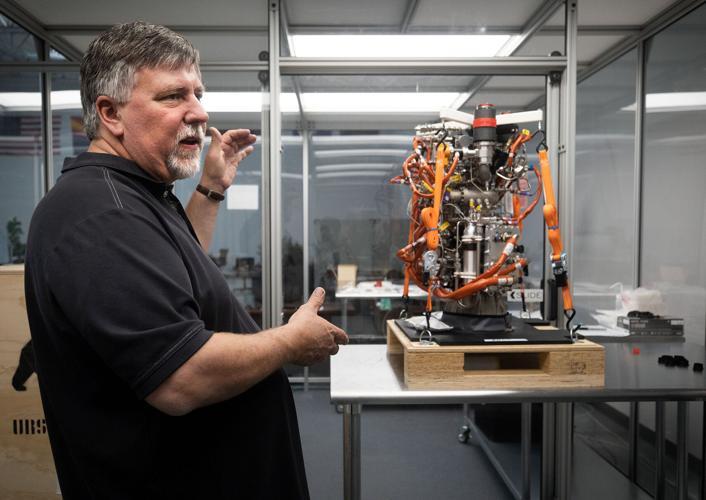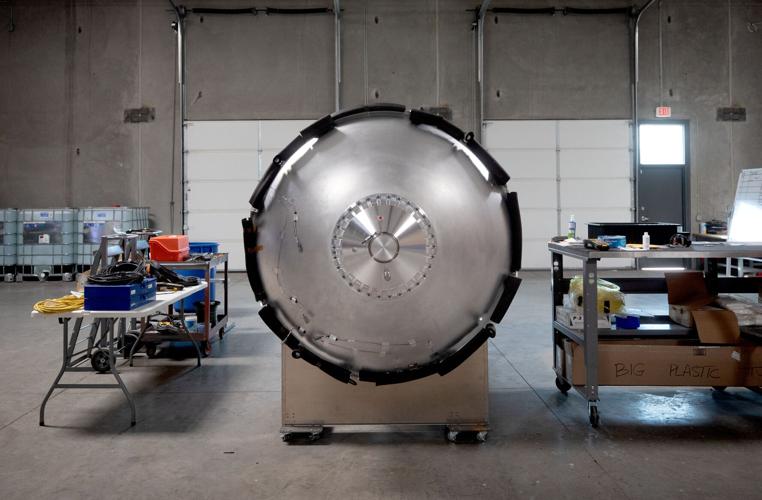All the parts seem to be falling into place for Tucson’s latest small-rocket startup, Phantom Space Corp., which plans to launch an orbital flight by next year.
At Phantom’s east side factory, a row of fuel-tank sections, a finished oxygen tank, 10 qualified off-the-shelf rocket engines and an array of other components are coming together to form the company’s first commercial rocket, the Daytona.
The company has several successful engine tests under its belt, including a milestone “hot-fire” test using a single engine in November, validating the rocket’s first and second stage systems.
It has lined up several launch sites — including Vandenberg Space Force Base in California, Cape Canaveral, Florida and, most recently, a site in Australia — and already has customers including NASA lined up for small-satellite launches.
And Phantom recently won city rezoning approval to operate a rocket-engine test facility on a 160-acre parcel of undeveloped desert south of Tucson near South Wilmot Road, with plans to test a full first rocket stage with nine engines later this year, Phantom co-founder and CEO Jim Cantrell said.
If the test goes well and the company’s latest fundraising effort is successful, Cantrell said, the company hopes to launch an orbital test flight sometime in 2024, about a year later than planned for the four-year-old company.
“Looks like next year is the year to throw something into space,” he said. “It's really kind of dependent on us closing our financing.”
Cantrell, who was a vice president at Elon Musk’s SpaceX in the company’s early days, says he’s confident Phantom’s testing program is on track.
Founded in 2019, Phantom aims to become a one-stop shop for small satellites, serving as launch service, satellite designer and builder and manager of satellite “farms” or constellations.
Phantom’s approach is to use off-the-shelf components, including engines, combined with its own innovative designs to mass-produce rockets and space vehicles.
That’s a departure from that of Cantrell’s last Tucson-based space startup, Vector, which was founded in 2016 with a mission of launching microsatellites into orbit using a proprietary rocket engine and special fuel. The company failed in 2019, after development delays and the withdrawal of a major investor.
Cantrell says Phantom Space is a different animal, using production engines and a common liquid fuel mix.
3D-printed engines
The engines the company is using, the Hadley model made by Colorado-based Ursa Major Technologies, already are in production with 3D-printed parts. Phantom has 10 engines on hand, mostly still in wooden crates, with 200 on order.
The reusable Hadley engine — named for a character in a Ray Bradbury sci-fi novel — generates 5,000 pounds of thrust using a mix of liquid oxygen and kerosene-based rocket propellant.
Ursa Major, founded by another SpaceX veteran, also is developing a larger engine, called Ripley, that provides 50,000 pounds of thrust. The company recently was awarded an Air Force contract to develop a small engine for hypersonic missiles, as well as a heavy-lift rocket engine called the Arroway.
Phantom plans to gang together nine first-stage Hadley engines to provide enough thrust to launch a payload of up to 450 kilograms, or about 990 pounds, aboard the roughly 60-foot-long, 39,000-pound Daytona rocket.
The rocket’s second stage uses a single, vacuum-optimized version of the Hadley to push the payload into low-Earth orbit.
For the future, Phantom also is designing a larger rocket called the Laguna, to carry payloads up to 1,200 kg using Ursa Major Ripley engines.
So far, the Hadley engines have worked perfectly in testing, including the November hot-fire test of a Hadley at Spaceport America in New Mexico.
The company is on track for hot-fire testing of all nine of the first-stage engines by this fall, and a test flight in 2024, Cantrell said, noting that Ursa Major qualifies the engines to assure they meet flight requirements before delivery.
Building and testing
Phantom is in the process of building its own fuel tanks and fuselage sections at its 32,000-square-foot building near East 22nd Street and South Pantano Road. The company is using a large, rotary welding jig to swiftly and accurately weld together fuel-tank sections nearly 5 feet in diameter.
“We just built our first flight tank two weeks ago, and we're in the process of building the rest of our flight tanks for testing, so we’re going to have a full-scale vehicle here,” said Cantrell, who recently published a book about his adventures in the space industry.
The biggest hurdle for the company now, Cantrell said, is raising millions of dollars in new capital investment to fund the final testing program.
Phantom has raised more than $27 million in venture capital, including a $21 million funding round in December 2021, and Cantrell figures the company will need a total of about $50 million to reach its testing goals.
The prospects of a recession and the recent bankruptcy of Virgin Orbit, a small-sat spinoff of Richard Branson’s spaceplane-based launch company Virgin Galactic, have chilled the private equity market for small space startups.
Private market investment in space startups dropped 58% in 2022 to $20 billion, after a record $47 billion invested in 2021, with later-stage companies most affected, according to a report by the New York-based venture-capital firm Space Capital.
“It's been really, really tough this year to raise money, but we're fortunate that we're so lean and mean we're gonna be one of the last companies standing after the carnage, potentially,” Cantrell said.
Deep talent
But Phantom Space, which has 28 employees, has assembled an executive team with deep experience in commercial space.
Christopher Thompson joined Phantom in October 2021 as chief technology officer after spending nearly four years as engineering head and chief engineer for advanced projects at Astra, a California-based small-rocket company that has had two successful orbital launches since 2020.
Before that, Thompson was a vice president at Virgin Galactic and spent 10 years as an executive with SpaceX, where he played a key role in development of the Falcon 9 rocket.
In July 2021, Phantom hired Mark Lester, former CEO of Alaska Aerospace Corp., which owns and operates the Pacific Spaceport Complex on Kodiak Island, Alaska.
Lester came aboard as vice president of launch operations and was named chief operating officer in March 2022.
The stakes are high for Phantom as customers line up, but the Tucson startup is in good company.
Customers await
In January 2022, Phantom Space was among 13 companies picked by NASA to participate in its Venture-Class Acquisition of Dedicated and Rideshare (VADR) program, which fosters development of new, small launch vehicles for NASA payloads.
Among the other awardees were big launch providers SpaceX, Jeff Bezos’ Blue Origin, United Launch Services (Boeing-Lockheed Martin) and Northrop Grumman’s Chandler-based rocket division; and small-rocket startups Rocket Lab, Astra and Firefly.
Last November, Phantom announced it was awarded four new NASA task orders to launch small “CubeSat” satellites into space as part of the VADR contract.
Phantom also has signed an agreement with San Diego-based Ingenu to produce and launch a 72-satellite constellation to run a planned network linking to smart devices on Earth as part of an “industrial internet of things.”
About the book
Somehow as he worked to get Phantom Space off the ground in the last few years, Cantrell wrote a 364-page book about his experiences in the early days of the New Space industry, including the formation of Musk's SpaceX.
Cantrell's book, "Breaking All The Rules: The Inside Story of the New Space Race" was released in late March and is available on Amazon.com.
In the book, Cantrell traces the origins of a "second Space Race" that began at the end of the original 1960s U.S.-Soviet race to the moon and eventually led to SpaceX and the explosive growth in commercial space.
He also offers his insights on the human fascination with space travel and recounts pivotal points in his own career — including a phone call he got out of the blue in July 2001 from Elon Musk, seeking advice on space development with the ultimate goal of establishing human colonies on Mars.
Watch as Tucson-based Phantom Space conducts a milestone "hot fire" ground test of a rocket engine as it develops spacecraft to launch small satellites into orbit. Video courtesy Phantom Space.





